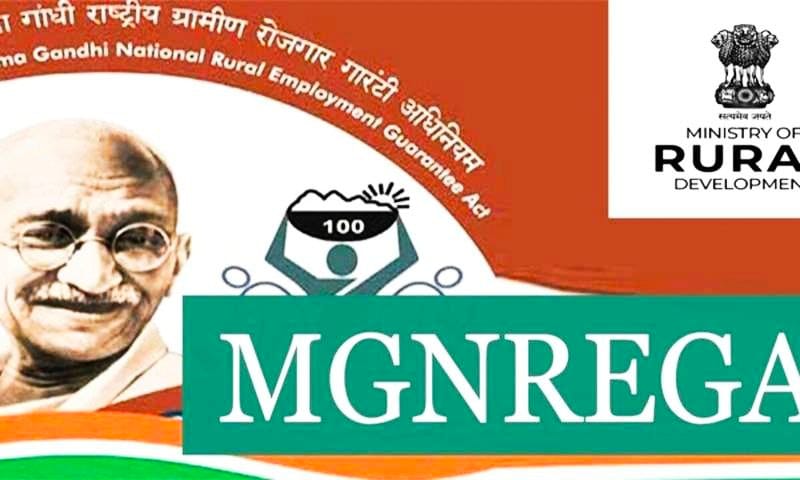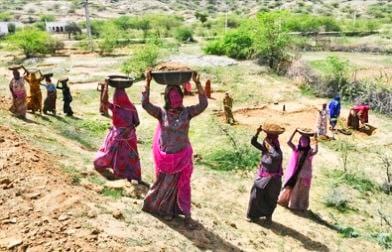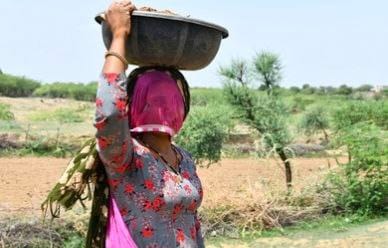Social Welfare Policies – Employment: Mahatma Gandhi National Rural Employment Guarantee Act (MGNREGA)
The Mahatma Gandhi National Rural Employment Guarantee Act (MGNREGA) is one of India’s most significant social welfare policies aimed at providing employment and improving livelihood security in rural areas. Enacted in 2005, the Act guarantees at least 100 days of wage employment to every rural household whose adult members are willing to do unskilled manual work. It is a rights-based framework designed to address rural poverty and unemployment while promoting the creation of durable assets and infrastructure in rural areas.

Key Features of MGNREGA
- Right to Employment:
- MGNREGA provides a legal guarantee of 100 days of employment per financial year to every rural household willing to work.
- Employment is to be provided within 15 days of the job application, and if not, the worker is entitled to a daily unemployment allowance.
- Focus on Unskilled Manual Labor:
- The scheme is aimed at providing employment in unskilled manual labor, which is accessible to all rural households, irrespective of education or skills.
- Minimum Wage Guarantee:
- MGNREGA ensures that workers are paid minimum wages as prescribed by state governments. The wage is paid according to the work completed rather than hourly or daily.
- Gender Equality:
- The Act mandates that at least one-third of the beneficiaries should be women. This is intended to promote gender equity by ensuring women’s participation in the workforce.
- Work Close to Home:
- Employment is to be provided within a 5-kilometer radius of the applicant’s residence. If the work is provided beyond 5 km, the workers are entitled to extra wages to cover transportation and living costs.
- Social Inclusion:
- MGNREGA seeks to improve the livelihoods of the most vulnerable sections of society, such as Scheduled Castes (SCs), Scheduled Tribes (STs), women, and other marginalized groups. The scheme ensures that no one is excluded on the basis of caste, gender, or class.
- Creation of Rural Infrastructure:
- The work provided under MGNREGA focuses on the creation of durable assets that improve rural infrastructure, such as:
- Irrigation facilities (check dams, canals)
- Road construction
- Water conservation and land development
- Afforestation and drought-proofing measures
- The work provided under MGNREGA focuses on the creation of durable assets that improve rural infrastructure, such as:
- Transparency and Accountability:
- The Act includes several provisions to ensure transparency and prevent corruption, such as:
- Social audits to allow for community oversight of the implementation of the scheme.
- Gram Sabhas (village assemblies) are empowered to monitor the works, prioritize the projects, and select the beneficiaries.
- Workers are paid through bank accounts or post office accounts, ensuring direct transfer of wages and reducing leakages.
- The Act includes several provisions to ensure transparency and prevent corruption, such as:
- Time-bound Payments:
- Workers must be paid within 15 days of the completion of work. Delayed payments attract compensation under the Act.
- Grievance Redressal Mechanism:
- MGNREGA mandates the setting up of a grievance redressal system to address complaints about non-availability of work, delayed payments, or any other issues.

Objectives of MGNREGA
- Poverty Alleviation:
- By guaranteeing wage employment, MGNREGA aims to reduce rural poverty by providing a steady income to the rural poor, especially during the agricultural off-season.
- Employment Generation:
- The primary objective is to provide employment and income security to rural households. The guaranteed 100 days of work can help reduce rural unemployment and migration to urban areas in search of jobs.
- Sustainable Development:
- MGNREGA encourages the creation of sustainable assets like water conservation projects, roads, and other infrastructure that can contribute to agricultural productivity, water security, and rural development.
- Empowering Women and Vulnerable Groups:
- By mandating one-third participation of women, MGNREGA helps empower women by giving them access to income and a role in decision-making at the household level.
- The Act also aims to include marginalized communities like SCs, STs, and other disadvantaged groups in the development process.
- Strengthening Decentralized Governance:
- The Act strengthens decentralized planning by involving local bodies like the Gram Panchayats in the planning and implementation of works. This encourages local participation in development.
- Environmental Conservation:
- MGNREGA promotes environmental sustainability through projects focused on soil conservation, water harvesting, and afforestation, which help improve the ecological balance in rural areas.
Impact of MGNREGA
- Employment and Income Security:
- MGNREGA has provided employment to millions of rural households since its inception. It has helped ensure income security, especially during lean agricultural seasons or periods of economic distress.
- In many states, MGNREGA has been crucial during droughts or other natural disasters by offering wage employment and building assets that mitigate the effects of such events.
- Reduction in Rural-Urban Migration:
- By providing employment in rural areas, MGNREGA has reduced distress migration to cities. Rural workers who might otherwise have moved to urban centers in search of jobs have found work within their own villages.
- Women’s Empowerment:
- MGNREGA has been successful in empowering rural women by providing them with employment opportunities and improving their economic independence. In many areas, women’s participation in MGNREGA work exceeds the mandated one-third quota.
- It also provides women with a role in asset creation and community development, contributing to their overall empowerment.
- Infrastructure Development:
- The scheme has led to the development of rural infrastructure, particularly in irrigation, water conservation, and rural roads. These assets have had long-term benefits for agriculture, rural livelihoods, and overall economic development.
- Improved Rural Wages:
- MGNREGA has helped increase rural wage rates, as it acts as a benchmark for minimum wages. This has led to an improvement in the bargaining power of rural laborers and contributed to reduced exploitation of rural workers.
- Social Inclusion:
- The scheme has helped integrate marginalized communities into the economic mainstream. By ensuring job opportunities for SCs, STs, and other disadvantaged groups, MGNREGA has contributed to social equality.
- Ecological Benefits:
- Many MGNREGA projects focus on water conservation, afforestation, and land development, which have had positive effects on the environment. The development of water bodies and other assets has enhanced water availability and contributed to agricultural productivity.

Challenges and Criticisms of MGNREGA
- Delayed Payments:
- One of the most frequent criticisms of MGNREGA is the delay in wage payments. Workers often face long delays in receiving their wages, which undermines the goal of providing timely income security.
- Corruption and Leakages:
- Despite efforts to enhance transparency, MGNREGA has been plagued by cases of corruption, such as fake job cards, misreporting of work, and leakages in funds. These issues have led to inefficiencies in the implementation of the program.
- Low Quality of Assets Created:
- While the scheme promotes asset creation, concerns have been raised about the quality and durability of the assets. In some cases, assets created under MGNREGA have been found to be poorly maintained or ineffective.
- Underutilization of Funds:
- Some states have not been able to fully utilize the allocated funds due to inefficiencies in planning and implementation. This results in unspent balances and limits the potential impact of the scheme.
- Limited Scope for Skilled Labor:
- MGNREGA focuses on unskilled manual labor, which limits opportunities for skilled workers in rural areas. This can discourage educated or skilled individuals from participating in the program.
- Exclusion of Some Vulnerable Groups:
- While the scheme is inclusive, there are concerns that certain groups, such as migrant workers, the elderly, and disabled individuals, may face challenges in accessing the benefits of MGNREGA due to lack of proper identification or limited mobility.
- Sustainability of Funding:
- The financial cost of running MGNREGA is significant, and there have been concerns about the sustainability of funding for such a large-scale program. In times of economic slowdown, the availability of funds could become an issue.

Conclusion
MGNREGA is a transformative policy that has had a far-reaching impact on rural India by providing employment opportunities, reducing poverty, and promoting inclusive development. It has improved rural livelihoods, empowered women and marginalized groups, and contributed to the creation of critical infrastructure in rural areas. However, challenges such as delayed payments, corruption, and low asset quality need to be addressed to enhance its effectiveness. With continued reforms and efficient implementation, MGNREGA has the potential to further contribute to India’s goals of sustainable development and social equity.

